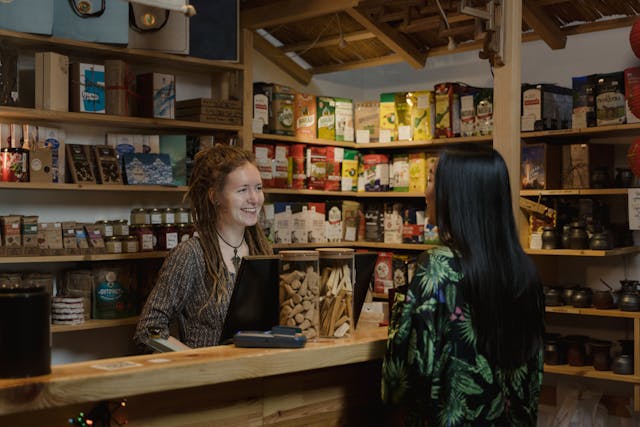
A groundbreaking $50 million food subsidy scheme that's slashing grocery prices by up to 50 per cent for remote Australian families has triggered an unexpected battle.
Independent food distributors have warned that they're being driven out of business by a 'government monopoly.'
The controversy centres on the federal government's Low-Cost Essentials Subsidy Scheme, which launched in July and promises to make 30 essential items in remote stores comparable to supermarket prices in urban areas.
While families in some of Australia's most isolated communities celebrate savings on basics like flour, pasta, and nappies, the businesses that have supplied these communities for decades say have been frozen out of their own industry.
The scheme that's dividing remote Australia
The Albanese Labor Government is investing $50 million over four years to reduce costs in more than 76 remote stores, expanding ultimately to 152 stores.
The program is administered by the National Indigenous Australians Agency and delivered through Outback Stores. These are Commonwealth-owned company providing retail management services to 56 First Nations owned stores across Australia since 2006.
The results have been impressive for consumers. During the successful trial phase, Outback Stores supported 72 stores across various regions, with feedback overwhelmingly positive and customers reporting significant savings.
Federal Minister for Indigenous Australians Malarndirri McCarthy has highlighted families telling her 'they've got a real reduction in prices by at least 50 per cent'.
'We're businesses who are so heavily relied on and praised during COVID. We kept our towns, hospitals, prisons and remote Australia fed during that really difficult time and now we're being ousted from our own industry.'
Yet, this story has a bitter counterpart. Independent distributors like Angela Cordero from Alice Springs-based Desert Distributors describe feeling 'utterly gobsmacked' at being excluded from what they see as their own industry.
Her business services prisons, hospitals, community stores, and roadhouses across a vast area extending into Western Australia, South Australia, Queensland, and up to Tennant Creek.
Why was the scheme needed?
To understand the controversy, it's crucial to grasp the scale of food insecurity in remote Australia.
In 2022-23, 51 per cent of First Nations households in remote Australia experienced food insecurity-a staggering statistic that highlights why government intervention seemed necessary.
Food and essentials in remote communities are expensive due to high freighting costs over long distances, supply chains that rely on few service providers with multiple transfer points, and small consumer populations with limited purchasing power that make bulk pricing unviable.
The remote food crisis by numbers
About 51 per cent of remote First Nations households experienced food insecurity in 2022-23.
Prices reduced by 30-50% under the new scheme, with 152 stores planning to participate.
The $50 million government investment over 4 years could cover 30 essential item categories.
The scheme works by having Outback Stores source essential items from manufacturers and wholesalers, using freight companies to deliver items to registered remote stores at subsidised prices, making it possible for stores to purchase essentials with freight and logistics costs subsidised.
The monopoly fears
Richard Forbes, chief executive of Independent Food Distributors Australia, argues the scheme creates unfair competition.
'You're effectively saying to the private sector, we've created a subsidy scheme where our own stores can provide food cheaper than you can,' he said, adding that this immediately affects the financial viability of private sector businesses.
The independent distributors' concerns centre on what they see as the government competing directly with private enterprise using taxpayer-funded subsidies.
Forbes has taken his concerns to the Australian Competition and Consumer Commission, arguing the scheme is anti-competitive. It could also result in a government monopoly if private businesses get forced to close.
Angela Cordero's situation illustrates the impact. She reports customers calling to say they're moving their purchases elsewhere due to the price difference. 'The outlook for my business is grim,' she said, warning that by the time all 152 stores join the scheme, 'it will be too late. The damage will be done and it will be irreparable.'
Success stories from participating communities
Despite the distributor concerns, feedback from participating stores and communities has been overwhelmingly positive.
Alastair King, CEO of Arnhem Land Progress Aboriginal Corporation, describes the scheme as 'a welcome initiative already giving remote First Nations customers welcome relief, significantly reducing prices while boosting health outcomes and making a real, tangible difference to customers' ability to feed their families'.
The scheme isn't just about cheaper prices. To participate, stores must sign up to a new National Code of Practice for Remote Store Operations that sets minimum national standards to improve governance, operations, and health.
Additionally, $21.4 million over four years has been committed to training and upskilling local First Nations staff in up to 106 stores, promoting good nutrition and healthy food choices.
More than meets the eye
What some might see as a simple grocery subsidy is actually part of a much broader strategy.
The scheme was introduced as part of the Prime Minister's Closing the Gap speech in February and followed by the launch of a 10-year National Strategy to improve food security in remote First Nations communities.
The 30 essential item categories are more extensive than they initially appear. Each category contains multiple products—six types of nappies, six shampoo and conditioner options, four flour varieties, and four pasta options, according to Angela Cordero's analysis.
The competition watchdog's role
Senator McCarthy has stated she was 'guided by the ACCC in the way I've rolled this out' and included the competition watchdog in forums with wholesalers to ensure compliance with guidelines.
However, this hasn't satisfied the independent distributors, who argue the ACCC should be investigating the scheme rather than advising on it.
The minister maintains the approach is sound, but the promised three-month review has not happened yet, adding to the independent owners' frustrations.
What this means for remote communities
For older Australians living in or connected to remote communities, this controversy represents a clash between immediate benefits and longer-term concerns.
Many seniors in regional areas understand both sides—the desperate need for affordable essentials on fixed incomes, and the importance of maintaining competitive business environments.
Outback Stores has been operating for 19 years, during which it has halted the closure of 19 stores, managed 13 out of administration, 4 through liquidation, reopened 2, and assisted 17 stores through significant financial hardships, currently supporting 58 stores across the country.
What seniors need to know about the remote food subsidy
- The scheme dramatically reduces prices on 30 essential items in remote stores
- It's expanding from 76 to eventually 152 participating stores
- Independent distributors warn it could create a government monopoly
- The ACCC has been consulted but concerns remain about fair competition
- A promised three-month review hasn't yet occurred
- The scheme is part of a broader 10-year food security strategy
Looking ahead
The expansion to 152 stores continues regardless of the distributor concerns, with Outback Stores encouraging continued collaboration between all stakeholders through the Remote Food Security Working Group.
However, the fundamental question remains: can government intervention to address market failures coexist with maintaining competitive private markets?
Independent distributors are calling for alternatives, such as point-of-sale subsidies that would allow stores to maintain existing supplier relationships while still delivering price benefits to consumers.
Angela Cordero suggests this would mean 'store owners could purchase from whomever they please, maintaining relationships that they already have' while avoiding supporting what she calls a 'government-backed monopoly.'
The stakes are high for everyone involved. For remote families struggling with food insecurity, the scheme represents genuine relief. For independent distributors, it could mean the end of businesses built over decades. For taxpayers, it raises questions about the most effective way to address market failures in remote Australia.
As this David-and-Goliath battle continues, the ultimate test will be whether the scheme can deliver on its promise of better food security without destroying the supply chains that kept remote Australia fed for decades.
What are your thoughts on this controversy? Have you experienced the high cost of groceries in remote areas, or do you have concerns about government competition with private business? Share your thoughts in the comments below.
Primary source:
Remote food subsidy scheme accused of creating a monopoly
Independent wholesale distributors are calling on the federal government to reconsider the $50 million food subsidy scheme for remote stores that rolled out on July 1 of this year. www.abc.net.au
www.abc.net.au
Food security in remote First Nations communities | NIAA
Cited text: 'The aim is to reduce the cost of items in remote stores to be comparable to supermarkets in urban areas, to help address cost-of-living pressures and ...'
Excerpt: '30 essential items in remote stores comparable to supermarket prices in urban areas.'
Food security in remote First Nations communities | NIAA
National Strategy for Food Security in Remote First Nations Communitieswww.niaa.gov.au
Reducing the cost of 30 essential items in Remote Communities | Ministers' media centre
Cited text: 'The Albanese Labor Government is investing $50 million over four years to reduce the costs of essential items in more than 76 remote stores. Over time...'
Excerpt: 'The Albanese Labor Government is investing $50 million over four years to reduce costs in more than 76 remote stores, expanding ultimately to 152 stores'
Reducing the cost of 30 essential items in Remote Communities | Ministers' media centre
The Albanese Labor Government is delivering on its commitment to help ease cost of living pressures in remote First Nations communities, with a new subsidy scheme for food and essential items starting today.From rice and tinned vegetables to nappies and toilet paper, the cost of 30 everyday...ministers.pmc.gov.au
Sign up to the National Code and Low-Cost Essentials Subsidy Scheme now | NIAA
Cited text: 'In 2022-23, 51% of First Nations households in remote Australia experienced food insecurity.'
Excerpt: 'In 2022-23, 51% of First Nations households in remote Australia experienced food insecurity'
Supporting Remote Cost-of-Living and Food Security | The Office of Impact Analysis
Cited text: 'Food and essentials in remote communities are expensive for many reasons, including the high cost of freighting the products the long distances between...'
Excerpt: 'Food and essentials in remote communities are expensive due to high freighting costs over long distances, supply chains that rely on few service providers with multiple transfer points, and small consumer populations with limited…'
Remote First Nations Communities to see major price drop on essential items as Federal subsidy rolls out
Cited text: 'To take part, stores must sign up to a new National Code of Practice for Remote Store Operations. The code sets minimum national standards to improve ...'
Excerpt:'To participate, stores must sign up to a new National Code of Practice for Remote Store Operations that sets minimum national standards to improve governance, operations, and health.'

Remote First Nations Communities to see major price drop on essential items as Federal subsidy rolls out
The federal government's food subsidy for First Nations communities begins Tuesday, cutting the cost of essential everyday items in remote areas.First announced in February, the program will reduce pr... nit.com.au
nit.com.au
Outback Stores engaged on remote affordability—Retail World Magazine
Cited text: 'The wholly owned Commonwealth company has been operating for 19 years. During this time, it’s been able to halt the closure of 19 stores, manage 13 ou...'
Excerpt: 'Outback Stores has been operating for 19 years, during which it has halted the closure of 19 stores, managed 13 out of administration, 4 through liquidation, reopened 2, and assisted 17 stores through significant financial hardships,…'







